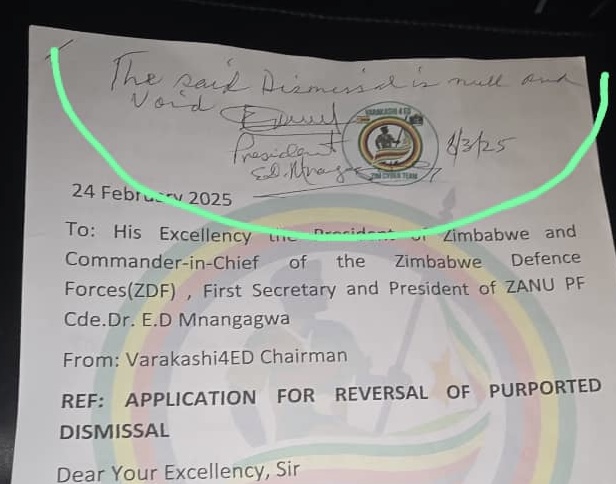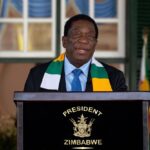Harare – Zanu PF is once again embroiled in internal turmoil, with recent expulsions and suspensions of party officials reminiscent of the late Robert Mugabe’s era. Those targeted claim they are being punished for opposing a campaign to extend President Emmerson Mnangagwa’s rule beyond 2028, a move that has ignited fierce factionalism within the ruling party.
While Mnangagwa has publicly stated his intention to step down at the end of his current term, his loyalists are reportedly pushing for a constitutional amendment that would allow him to remain in power for an additional two years. Critics argue that this “2030 agenda” is a calculated scheme to sideline Vice-President Constantino Chiwenga, who led the coup that ousted Mugabe in 2017, from the presidential succession race.
The campaign has caused deep divisions within Zanu PF, with some war veterans openly calling for the 82-year-old Mnangagwa to step down before his term concludes. In response, Zanu PF has taken a hard-line approach, expelling and suspending officials from various provinces perceived to be sympathetic to Chiwenga.
Blessed Geza, a Zanu PF central committee member and war veteran, is the most senior figure to fall victim to the purge. Geza went into hiding last month after police announced they wanted to arrest him for allegedly undermining Mnangagwa’s authority by demanding his resignation.
Other notable expulsions include Zanu PF MP for Gutu East Benjamin Ganyiwa, former youth leader Godwin Gomwe, Kudakwashe Gopo, Victor Manungo, Spencer Mutero, and Edson Vingwa. Zanu PF Harare provincial commissar Kudakwashe Damson, Harare provincial member Edson Ringwa, Misheck Mushwekwa, Lameck Chimanyiwa, Charles Matsika, Blessing Kambumu, and Nicole Mutasa have been suspended for various offences.
Speaking to The Standard, Kudakwashe Gopo claimed he was expelled from the party by individuals and was not given a fair hearing. “I accept the decision by the party, but the allegations against me were cooked up,” Gopo said. “I am going to remain a Zanu PF member because l was born in the party. There was no room for a hearing to answer any of the allegations in a hearing.”
Misheck Mushekwa suggested his expulsion was linked to the 2030 agenda, stating, “My comment is simple: we respect the party position, they see it fit that we might hinder the current initiative, hence our suspension. So we respect the decision of the party, but we will remain loyal to the party.”
Kudakwashe Damson, who was allegedly humiliated at the Zanu PF annual conference in Bulawayo last year for belonging to a faction opposing the 2030 agenda, echoed similar sentiments, saying, “I respect the decision of the party leadership. l will remain a Zanu PF member and I have always wanted to see Zanu PF strong.”
A Zanu PF source drew parallels between the current purges and those that occurred during Mugabe’s final years in power, including Mnangagwa’s own expulsion. “Battle lines have been drawn in Zanu PF,” the senior official said. “We are going to see more purges; we are in the succession season. The expulsion of party members is a blow to the Chiwenga camp.”
Political analyst McDonald Lewanika argued that the Zanu PF purge exposes growing discontent within the ruling party, linked to Mnangagwa’s succession. “The centre is not holding,” Lewanika said. “The resort to disciplinary action for forming WhatsApp groups, and criticising the leadership show that there is a groundswell of discontent within the party rank and file and consensus amongst leadership.” He added that history was repeating itself in Zanu PF, with dissent being crushed and those who think differently being ejected.
Methuseli Moyo, a Bulawayo-based political analyst, warned Zimbabwe to brace for more Zanu PF drama as Mnangagwa’s term nears its end. “Succession politics is merciless,” Moyo said. “There will always be casualties. This is not surprising. Otherwise we must expect more drama and intrigue going towards 2028 or 2030, whatever the case might be.”
Rejoice Ngwenya, a Harare-based political analyst, stated that the expulsions were not surprising, as Zanu PF is not democratic. “The expulsions are a symptom and manifestation that Zanu PF does not intend to stick to its democratic tenets,” Ngwenya said. “We see members of the party being victimised for having an opinion different from others about the 2030 agenda.”
Zanu PF is expected to elect its next leader at its congress in 2027, with Chiwenga seen as a strong contender.
In a further twist, President Mnangagwa has reversed a decision by Zanu PF’s legal secretary Patrick Chinamasa to fire six paid social media activists he called “rogue elements.” Mnangagwa decreed that “the said dismissals are null and void,” according to his hand-written comments on a letter of appeal by Jonasi Mandiwisa Musara, one of the affected individuals. The surprise u-turn is seen by some as results for Chiwenga’s behind-the-scenes fighting back.

Musara’s letter pleaded with Mnangagwa to “reverse the purported dismissals so that we can resume our work of using social media to defend, promote and popularise your remarkable #EDWORKS, Zanu PF party and our beloved motherland Zimbabwe.” He also indicated that he had recently met Mnangagwa, who “made it clear that you had not authorised the dismissals.”
This intervention, undermining Chinamasa, could further divide the party, which is already battling factional fights linked to succession politics. Chinamasa is the executive director of Varakashi4ED Social Media Unit, a group of Zanu PF online activists paid to attack Mnangagwa’s critics and amplify party messages. He stated that he fired the activists for insulting him and other officials.
Tinotenda Gachange, one of the sidelined activists, posted Musara’s letter on X, including Mnangagwa’s handwritten comments. Gachange appeared to accuse Chinamasa of trying to intimidate them into abandoning their support for the 2030 agenda.
“Successionists and rogue anti-2030 elements cloaked in deceit are attempting to silence the voices of progress. Their intimidation tactics are clear signs of cowardice, aimed at undermining the persuasive efforts of the 2030ists who support President Mnangagwa’s term extension,” Gachange wrote on X. “President Mnangagwa stands firm, and so do we, undeterred and unbowed.”
Mnangagwa continues to deny ambitions to extend his term, but critics maintain that he is privately encouraging supporters to continue the campaign. The other activists set to return are Tafadzwa Mawire, Felix Muzondo, Pardon Mangwende, and Herbert Mathe.












